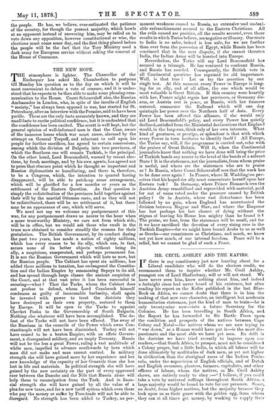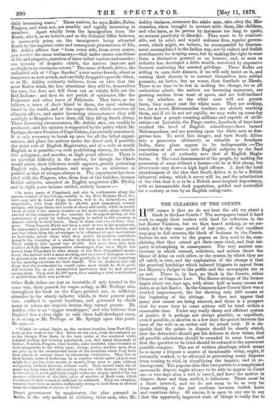MR. CECIL ASHLEY AND THE KAFIRS.
TF there is any constituency just now hunting about for a 1 Liberal candidate who will do the electors credit, we recommend them to inquire whether Mr. Cecil Ashley, youngest son of Lord Shaftesbury, will or will not stand. We have never seen him, know nothing about him, and indeed a fortnight since had never heard of his existence, but after reading his report on the Kafirs published in the last Blue- Book on Africa, we cannot doubt that there is in him the making of that now rare character, an intelligent but moderate humanitarian statesman, just the kind of man to train—he is only twenty-nine now—into a future Secretary for the Colonies. He has been travelling in South Africa, and. the Report he has forwarded to Sir Bartle Frere upom the condition and prospects of the natives between Cape Colony and Natal—the natives whom we are now trying to "war down," as a Roman would have put it—is the most dis- passionate and the most able we have yet seen. Its drift is the doctrine we have tried recently to impress upon our readers,—that South Africa, to prosper, must not be considered a Colony proper, but a little India, in which all labour will be done ultimately by multitudes of dark men, as yet not higher in civilisation than the aboriginal races of the Indian Penin- sula, under the supervision of English officials, and of Dutch and English overseers, planters, farmers, capitalists, and other officers of labour, whom the natives, as Mr. Cecil Ashley shows, are entirely ready to obey :—" I believe, if you could take a vote by universal suffrage throughout South Africa, a large majority would be found to vote for our presence. Some, no doubt, from higher motives, but the majority because they look upon us as their goose with the golden egg, from whom they can at all times get money, by working to supply their daily increasing wants." These natives, he says, Kafirs, Zulus, Fingoes, and what not, are steadily, and rapidly increasing in numbers. Apart wholly from the immigration from the North, which, as we believe, and as the Colonial Office believes, is incessantly going on, the immigrants being attracted South by the superior order and consequent pleasantness of life, Mr. Ashley affirms that "from every side, from every source, you receive the same testimony,—that under secure conditions of life and property, cessation of inter-tribal warfare and murder- ous tyranny of despotic chiefs, the natives increase and multiply to en enormous extent." The curse of South Africa, the unlimited sale of "Cape Smoke," a raw native brandy, about as dangerous as new arrack, and carefully drugged to provoke thirst, or as Mr. Ashley evidently believes, from an idea that the more Kafirs think, the less obnoxious they will be, demoralises the race, but does not kill them out as whisky kills out the Red Indians ; and they do not perish of epidemics, like the Feejeeans and other races of Polynesia. They have, as we believe, a trace of Arab blood in them, the most enduring blood in the world, and of the negro blood, which survives all climatie effects, and under favouring circumstances they will multiply as Bengalees have done, till they fill up South Africa. These favouring circumstances, Mr. Ashley says, can readily be produced ; and his opinion is supported by the policy which Mr. Spriggs, the new Premier of Cape Colony, has recently announced. It is only necessary to break up once for all the tribal organi- sations, and place the natives under the direct and, if possible, the strict rule of English Magistrates and of a code as nearly English as is possible,—a code prohibiting slavery, its correla- tive polygamy, and murder, as high penal offences. There is no material difficulty in the matter, for though the Chiefs would resist, their followers would approve, greatly preferring English rule, independence, and wages to an existence as painful as that of savages always is. The experiment has been tried with the Fingoes, who, from fear of the Galekas, became British subjects, accepted an English magistrate (Mr. Myth), and in eight years became settled, orderly farmers :— "In many parts of Fingoland, and also in settlements along the eastern frontier of the Colony, notably in the Keis Kamma Hock dis- trict, may now be found Fingo farmers, well to do, industrious, and respectable, with from £2,000 to £4,000, good homestead, several ploughs, and large flocks and herds of sheep and cattle, while in nearly every di-trict of the eastern frontier on the main roads, along which is carried all the commerce of the country, the transport-riding, as the conveyance of goods by bullock-waggon is called in this country, is almost entirely in their hands. Many of them own two or three wag- gons. When Captain 'Myth had been a year or two in his magistracy, he summoned a great meeting of all the bead men of the kraals, and putting before them the advantages to be obtained at such institutions as Lovedale, asked them what they would themselves contribute towards the founding of a similar institution in their own country. Their reply to this appeal was £1,500. And morn than this, they realised so fully these prospective advantages, that wh. n Blyth was moved from Fingoland to take charge of the East Criqualand magis- tracy, the natives held a mass meeting, and expressed their great desire to present him with some token of the gratitude he had won from them by his untiring exertions for their benefit. This he declined, but told them that the testimonial he would value most would be their good- will towards the as yet incompleted institution that he had started among thorn. They sent £1,500 more, thus making a total contribution of £3,000 from their own pockets."
Other Kafir tribes are just as tractable, if only treated in the same way, their passion for wages acting, as Mr. Trollope also, throughout his book on the Cape, pointed out, as sufficient stimulus to the steady industry which, in their present posi- tion, confined to special locations, and governed by chiefs many of whom are despotic brutes, they cannot pursue. Mr. Ashley. who is no nigger worshipper,' and who believes that England has a clear right to rule these half-developed races, is as strong as Mr. Trollope or Mr. Spriggs upon this point. He says :— "Within its actual limits on the eastern frontier, from Port Eliza- beth on the west to the Kei ' River on the oast, from the seaboard up to the Orange Free State, in the very midst of the scattered white colonial trading and farming population, you find many thousands of Gaikas, Tembus, Fingoes, some hostile, some doubtful, some friendly in their sympathies to the white race; strong, active, warlike men, they are pent up in the overcrowded limits of the locations where they have been placed at various times by advancing civilisation. They live in their kraals, oases of barbarism in a country which under proper care might be a garden, from month to month, from year to year, without occupation, without interest, without work. They cannot hunt, for all game has long since left the country, they are idle because they have no incentive to work, and their frugal wants are amply satisfied by the meagre cultivation of the littlo plots of mashies or Kafir corn, which the labour of their women is sufficient to maintain. They are drunken, because they have no motive sufficiently strong to lead them to abstain from the temptation of excess of drink."
Direct government by magistrates, the plan pursued in India, is the only method of civilising these men, who, Mr. ' Ashley declares, reverence the, wliite man, w,ho obey the xis- signaries, when brought in, contact with,,,thein„like children, and who have, as he proves by ingtances too long to cincte, no ,natural proclivity to digorder. They. want to ,be comfort- able, not to rebel, and would welerenefirm, regular govern- ment, which might, we believe, be, accompanied by disarma- ment, accomplished in the Indian way, pot by violent, and foolish punishments for keeping arms, but by nping,tlig right to wear them a distinction granted as an honour, and, as soon as industry has developed a little wealth, restricted by expensive licences conferring the coveted privilege. These Kafirs are willing to earn their dinners, if we will only insist on it, and earning their dinners is to convert themselves into , settled peasants, no better, but no worse, than Sonthals or„Bheels. There is no time to be lost in making the change, for_as all authorities admit, the natives are beconiing numerous, are growing restless from want of space, and are half-inclined to try whether, as the white man will not govern them, they cannot oust the white man. They are seeking, too, for a creed, Mahommedan teachers are already reaching them, and if we do not act rapidly, we may wake up some day to find that a people counting millions and capable of civili- sation—at Lovedale, the Fingo centre, hundreds of boys have reached the level of English schoolboys—have turned Mahommedans, and are pressing upon the white men as dan- gerous foes. To avert this danger, and turn South Africa into a possession ultimately as valuable as Southern India, three plans appear to be indispensable :—The conversion of all natives into English subjects, by the final extinction of all authority save that of English Magis- trates. 2. The total disarmament of the people, by making,the possession of arms without a licence—to be at first cheap, but afterwards very dear—a high legal offence. 3. And the total abandonment of the idea that South Africa is to be a British labourers' colony, which it never will be, and the substitution of the idea that it is to be a British semi-tropical dependency, with an innumerable dark population, guided and controlled for a century or two by an English ruling caste.







































 Previous page
Previous page